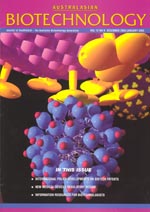
|
Australasian Biotechnology (backfiles)
AusBiotech
ISSN: 1036-7128
Vol. 12, Num. 5, 2002, pp. 7
|
Australasian Biotechnology, Vol. 12, No. 5, Oct-Nov, 2002, pp. 7
From the Editor
Martin Playne, Editor
Code Number: au02028
Dear Readers
Welcome to the October edition. It has
been a pleasing couple of months, with
a record turn-out at an exciting and
comprehensive AusBiotech2002
conference ( which is fully reported in
this issue), and some great
membership and external feedback on
how most of you like this journal! As
Editor, it is very satisfying to know
that the journal really does have an
important place in the new
AusBiotech, and is much appreciated.
Nevertheless, it is important that we
continue to get reader feedback to help
us produce the sort of balance you
want in your journal in terms of
articles vs news items vs AusBiotech
information, and what other items
that you would like us to introduce.
Feedback is welcome at any time;
however, we are planning a detailed
readership survey for our next two
issues. I hope you will take 15 minutes
then to answer the survey, as it will
help us a lot.
Biotechnology is certainly at the
forefront of news on many fronts: the
stem cell debate in parliament; GMOs
in foods and on the farms; biofuels to
replace petroleum fuels; and the
threats of bio-terrorism. It is easy to
blame biotechnology, to blame
scientists, to blame companies for
shortcomings and difficulties which
arise when new technologies are
introduced. It is easy to expect to live a
life where risks are minimal, and where
it is always somebody else's fault.
However, the reality is that everyone
takes risks of a high magnitude every
day - crossing the road,
smoking a cigarette, running
to catch a train, going ski-ing,
having sex .... I think we have
to ask ourselves: "do we really
want to live in a world like
that of our cave-men
ancestors?" or "do we prefer
the benefits (and costs) of
electricity and gas supplies to
our houses; the ability to drive
modern cars and to fly
anywhere in the world?"
Biotechnology will bring huge
benefits to mankind, but there
will be difficulties and
problems that we have to
overcome along the way.
Our political masters (actually
they are our servants) must
not shy away from their
responsibility to develop
Australia as a modern,
compassionate yet advanced
technological society. If they do not
understand the science behind a
particular technology, then it is THEIR
duty to find out about it, to learn and
explain to their constituents. It is not
our duty to shoulder that
responsibility solely.
I will be trying to produce over the
next 12 months, special features on
stem cells, GMOs, new traditional bioindustries
(fuels, chemicals, enzymes),
and, if driven by the course of world
events, bioterrorism and biological
vigilance. To produce such features
does very much depend on your
response as readers, and on your
willingness to put down on paper your
ideas, views and findings for us to
publish. I hope that , with your
cooperation, we will publish material
of general interest to a much wider
audience than our current readers -
material which will assist politicians
and the general public to better
understand the new bio technologies.
One thing I found most interesting at
the recent AusBiotech conference was
the view of the Hon. Ian Macfarlane
during his dinner speech, saying that it
was no time for scientists to be split
over the issues of stem cell research,
and that we should be speaking as one
voice, otherwise the parliamentary
debate could well be lost. I can hear
where he is coming from, but on the
other hand it indicates lack of
acceptance of how the creative process
works, be it in science or in the arts.
Scientists are always challenging each
others' ideas, and indeed, the stepwise
development of ideas and theories
would not occur without such
challenge. The public must understand
such challenge is a normal part of the
scientific process, and must honour
and cherish it rather than decry it as
some form of disloyalty or uncertainty.
For this very reason, I think the GMO
debate we have been having is for the
most part a healthy thing to happen,
and eventually will lead to the best
outcomes. I know it is annoying, often
costly, and can be twisted and falsified
by those with other agendas - but
eventually that gets seen through as
false. On reflection, I prefer a society
where there is uncertainty, where
things do go wrong sometimes, and
where there is risk, rather than a
society which is dull entirely
predictable and risk-free.
For those readers who knew I had a sixweek
break recently, we had a
great time in inland and north
Queensland learning about
fossils and dinosaurs and
bilbys and emus (how to avoid
them). We discovered that
Longreach runs sunset cruises
on its river - believe it or not,
paddle steamers ply the 14 km
billabong every evening, even
in a drought year! I also
discovered that a
biotechnology industry is
emerging in north Queensland
and that there is now an
organisation with a
membership of more than 40
called BioNQ. I expect the
biotech community will be
hearing more from the north
in years to come.
Copyright 2002 - AusBiotech
|
